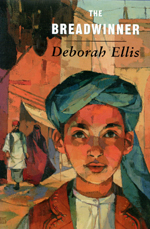Note: I am currently enrolled in a children's resource class in my library program, and this past week we were discussing the promotion of global awareness through materials, including The Breadwinner. I generally try to keep my blog focused on the newest releases, but I also plan to write about any novels published in the last decade that are assigned in my classes. Occassionally, I might also write about older books if they're relatively obscure or recently republished.
The Breadwinner
by Deborah Ellis
Middle East Book Award 2002
Written in 2000 (and hence pre-9/11), The Breadwinner tells the story of eleven year-old Parvana, a girl growing up in an Afghanistan governed by the Taliban. Before the takeover by the Taliban, her mother was a journalist and her father a teacher. The family lived in a large house, owned a television, and sent their daughters to school. But with the regime change, women were forbidden to work or attend school. The numerous bombings have forced the family from their comfortable home into a one-room apartment in Kabul, and Parvana's father sells his services as a letter-writer or reader in the marketplace.
A few chapters into the book, Parvana's father is arrested. The only reason given is that he was educated in England. With the only male in the family being Parvana's two year-old brother, Ali, Parvana's mother decides that Parvana must disguise herself as a boy in order to support the family until her father's release from prison.
The reason this book seems to be admired is likely because it's one of few books for young readers to detail events in Afghanistan under the Taliban. The writing here is very straightforward, introducing the reader to the culture through the narrative, rather than in lengthy explanations. A short glossary in the back also helps to define some of the foreign words, such as burqa and karachi. While most children reading The Breadwinner are probably unfamiliar with Afghanistan outside of what they might hear on the news, Parvana's presentation as a normal kid will enable them to empathize with her struggle.
Interestingly, Islam is almost entirely absent from the narrative. I'm not sure if the intent here was to prevent the demonization of the religion, though, given when the book was written. Perhaps, instead Ms. Ellis simply didn't want the narrative to become mired in complex explanations of Islamic practices.
Given that Ms. Ellis only spent a few weeks in Afghanistan doing research before writing this novel, some people will complain that it lacks an authentic voice. The issue of authenticity is a complex one, and I will not get into it here. If you are interested in this issue, I highly recommend Malinda Lo's blog post. I will point out, however, that a very similar (albeit more depressing story) is told in the Afghan film Osama, so Ms. Ellis can't be totally off-base.
Grade: B+

No comments:
Post a Comment